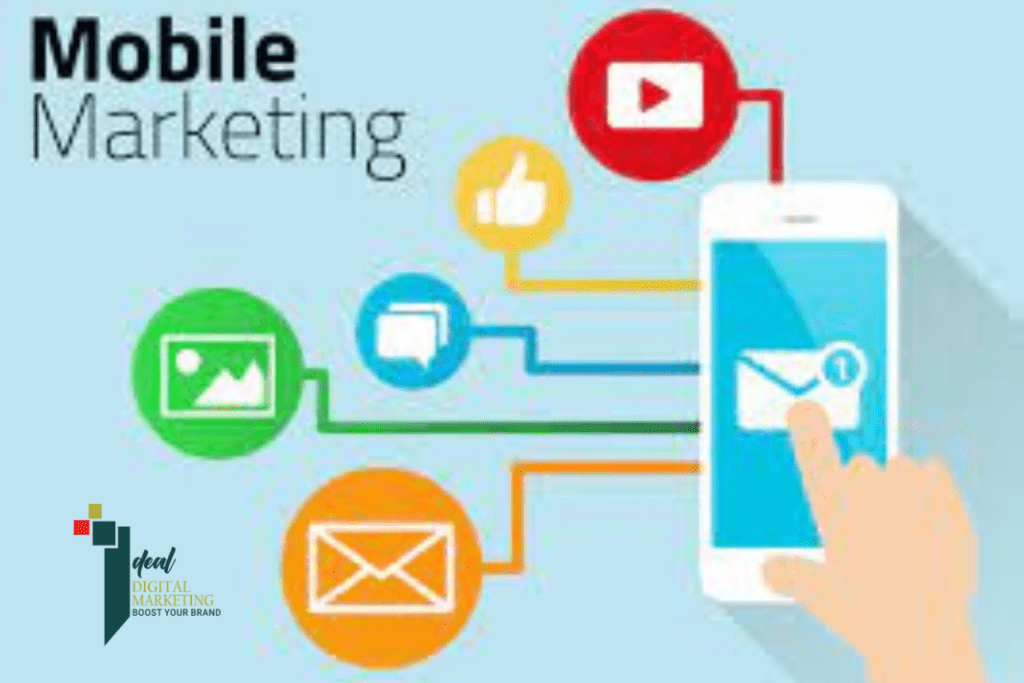The Benefits of Mobile Marketing
Mobile marketing has evolved as a potent tool for organizations to communicate and engage their target audiences in today’s digital environment as cell phones have become an important component of our everyday lives. With the majority of the world’s population possessing a mobile device, businesses of all sizes may gain greatly from using mobile marketing tactics. In this article, we’ll look at the benefits of marketing via mobile devices and how it may help organizations find new possibilities.
1. Wider Reach and Increased Exposure
Mobile marketing allows organizations to access a far bigger audience than traditional marketing tactics. Because of the growing number of smartphone users globally, your advertising message may readily reach potential clients at any time and from any location. By optimizing your mobile marketing activities, you may boost brand visibility and exposure, leading to increased brand awareness and consumer engagement.

2. Personalized and Targeted Marketing
The capacity to offer personalized and targeted communications to your audience is one of the most significant advantages of mobile marketing. Location, browsing patterns, and preferences are all provided by mobile devices, providing important information about user behavior. This information may be used to construct highly targeted marketing efforts that connect with your target audience on a personal level. You may boost client happiness, conversions, and long-term connections by offering appropriate information and offers.
3. Instant and Real-Time Communication
Mobile marketing allows businesses to establish instant and real-time communication channels with their customers. Through mobile apps, push notifications, SMS, and messaging apps, you can deliver time-sensitive messages, updates, and promotions directly to your customers’ devices. This instant communication not only enables you to provide excellent customer service but also allows you to capitalize on opportunities for immediate engagement, such as flash sales, limited-time offers, and event announcements.
4. Increased levels of engagement and response
Mobile devices have become an indispensable part of customers’ lives, with people spending more time on their phones than ever before. Applying mobile marketing strategies such as mobile-friendly websites, apps, and social media advertising will help you capture your target audience’s attention and enhance engagement rates. Because customers are more likely to interact with information that is quickly accessible on their mobile devices, mobile marketing campaigns usually have higher occupancy rates than traditional forms of advertising.
5. Enhanced Customer Experience
Mobile marketing offers businesses the opportunity to enhance the overall customer experience. By leveraging the capabilities of mobile devices, you can provide seamless and personalized experiences to your customers. Features such as mobile payments, mobile loyalty programs, and location-based services can streamline the customer journey, making it easier for customers to interact with your brand, make purchases, and access relevant information. By offering a convenient and user-friendly mobile experience, you can leave a positive impression on your customers and foster loyalty towards your brand.
6. Cost-Effectiveness
When compared to traditional marketing channels, mobile marketing may be a more cost-effective choice for organizations, particularly those with restricted marketing resources. Creating and delivering mobile content, such as mobile commercials, mobile-optimized websites, and mobile applications, frequently has cheaper costs than traditional print or television advertising. Furthermore, mobile advertising efforts are simple to track and analyze, allowing firms to optimize their plans and allocate expenditures accurately based on real-time data and insights.
7. Integration with Other Marketing Channels
Mobile marketing can seamlessly integrate with other marketing channels to create a cohesive and comprehensive marketing strategy. By combining mobile marketing with social media, email marketing, and offline advertising, you can amplify your brand message and reach a wider audience. For instance,
you can use mobile QR codes on print advertisements to drive traffic to your mobile website or app. Such integration enhances the effectiveness of your marketing efforts and provides multiple touchpoints to engage with your audience.
Conclusion
Mobile marketing has transformed the way organizations communicate with their clients, providing several benefits and opening up new avenues for growth. Mobile marketing has become a vital component of every successful marketing plan due to its greater reach, personalized targeting, quick communication, and increased engagement rates. Businesses may improve the consumer experience, increase brand awareness, and fulfill marketing goals cost-effectively and efficiently by implementing mobile marketing methods. Staying ahead in the digital environment in today’s mobile-dominated era needs firms to adapt and embrace the potential of mobile marketing.
Frequently Asked Questions (FAQs) on Mobile Marketing
1. What is mobile marketing?
Mobile marketing refers to the practice of promoting products, services, or brands to a target audience through mobile devices such as smartphones and tablets. It involves various strategies and techniques to reach and engage with mobile users effectively.
2. Why is mobile marketing important?
Mobile marketing is important because of the increasing adoption and usage of mobile devices worldwide. It provides businesses with the opportunity to connect with their target audience on a more personal and immediate level, delivering tailored messages, driving engagement, and enhancing the overall customer experience.
3. How can businesses benefit from mobile marketing?
Mobile marketing offers numerous benefits for businesses, including:
– Wider reach and increased exposure to a larger audience.
– Personalized and targeted marketing, resulting in higher conversion rates.
– Instant and real-time communication with customers.
– Higher engagement and response rates due to the popularity of mobile devices.
– Enhanced customer experience through mobile-friendly features and services.
– Cost-effectiveness compared to traditional marketing channels.
– Integration with other marketing channels for a comprehensive strategy.
4. How can businesses optimize their mobile marketing campaigns?
To optimize mobile marketing campaigns, businesses can:
– Ensure mobile-responsive design for websites and emails to provide a seamless experience across devices.
– Utilize data and analytics to understand user behavior and preferences for targeted messaging.
– Incorporate mobile-specific features like mobile payments and location-based services.
– Test and optimize mobile ads for optimal performance and conversion rates.
– Implement app store optimization (ASO) techniques for better visibility and downloads.
– Regularly update and improve mobile apps to enhance user experience.
– Leverage social media platforms to engage with mobile users and drive traffic to mobile channels
5. How can businesses measure the success of their mobile marketing efforts?
Businesses can measure the success of their mobile marketing efforts through various metrics, such as:
– Number of app downloads and active users.
– Conversion rates from mobile campaigns.
– Click-through rates (CTR) and engagement metrics for mobile ads.
– Mobile website traffic and bounce rates.
– Customer retention and loyalty metrics specific to mobile channels.
– Revenue generated from mobile conversions.
– Feedback and ratings received on mobile app stores.
– Return on investment (ROI) for mobile marketing campaigns.

